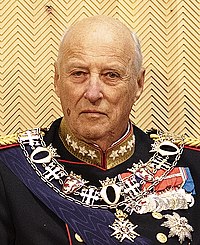
Photo from wikipedia
ABSTRACT The authors investigate the sociolinguistic dynamics in multilingual families from the point of view of speakers’ linguistic trajectories, ideologies, and repertoires. Drawing on interview data from intermarried couples of… Click to show full abstract
ABSTRACT The authors investigate the sociolinguistic dynamics in multilingual families from the point of view of speakers’ linguistic trajectories, ideologies, and repertoires. Drawing on interview data from intermarried couples of different generational and linguistic profiles of two families in Sweden, the authors examine how speakers’ lived experience with different languages shapes their stance toward bi- and multilingualism and how that particular stance in turn produces a series of effects and helps constructing specific language ideological frameworks from where speakers in that given context operate. From our analysis, it appears that an ideology of the native speaker as the legitimate and authoritative type of speaker is strongly present; the native speaker is in turn the one responsible for transmitting his or her language to the children. This is problematized by the reported language mixing that occurs in the home environment and the resulting nonobservance of the one person–one language strategy. More important than that, we argue that speakers’ ideological viewpoint in a social environment takes place dialogically and discursively. This has important consequences individually, for the speakers involved in that context, and collectively, for the type of framework that emerges.
Journal Title: Critical Inquiry in Language Studies
Year Published: 2019
Link to full text (if available)
Share on Social Media: Sign Up to like & get
recommendations!